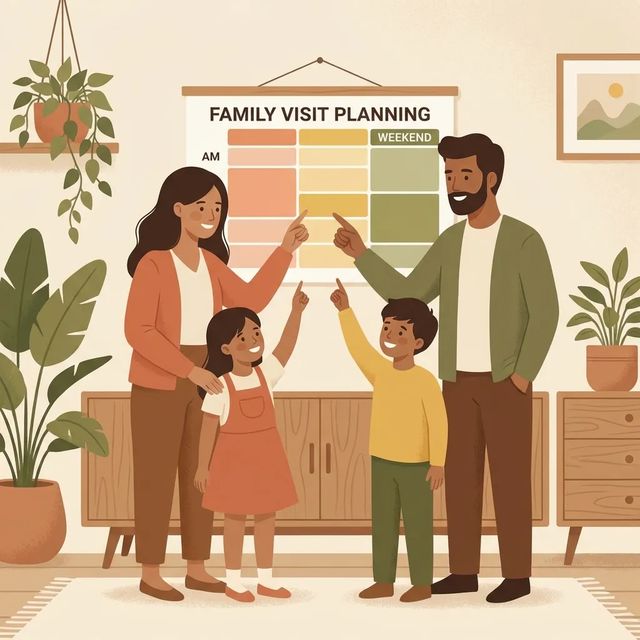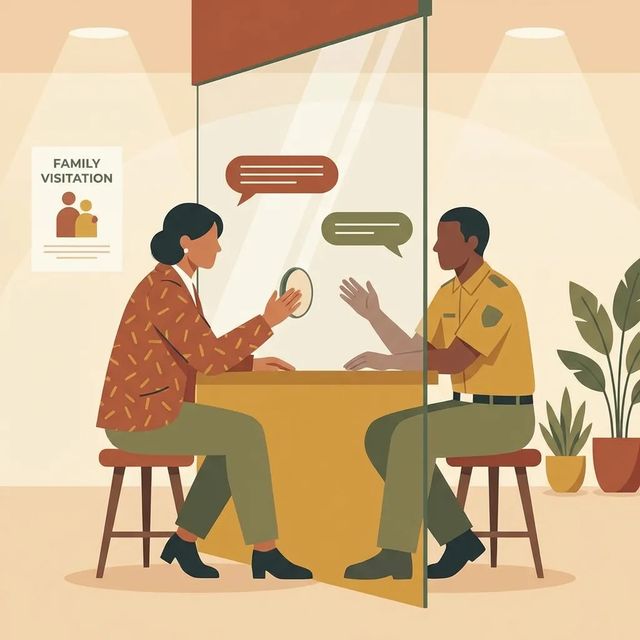Caroline Detention Facility, VA
Explore
Find an Inmate at Caroline Detention Facility, VA
Search for a loved one and send messages and photos in minutes.

Guides for This Facility

Caroline Detention Facility Visiting Hours — Who Can Visit When (by custody level)
Visiting at Caroline Detention Facility happens on weekends, but your exact time slot depends on your loved one's custody classification. Match the right window below and plan around the facility's processing cutoffs.
Read Guide
Caroline Detention Facility: Non‑Contact Visits (June 29, 2024 update) — What That Means and What You May Bring
Planning a visit to Caroline Detention Facility? As of June 29, 2024, all social visits are non-contact. Here's what that means day-to-day, plus what you can and can't bring.
Read GuideAt a Glance
Visitation
- All family or other social visits were changed to non-contact effective June 29, 2024.
- Visiting hours are set by custody level: low-medium male 5:30–9:30 p.m., medium-high male 1:30–5:30 p.m., female 11:30 a.m.–1:30 p.m., Special Management 9:00–10:00 a.m.
- Visitors must present a valid government-issued photo identification before being permitted into the facility (children under 18 are exempt when accompanied by their parent/guardian).
Communication
- HomeWAV provides the facility's video visits, which require an account and an internet-enabled device and are limited to 20 minutes.
- Fees for HomeWAV video visits are set and processed by HomeWAV; CDF does not collect those charges.
- Detainees at CDF have access to tablets and virtual visitation via gettingout.com.
Mail & Letters
- (Detainee Name & Number) Caroline Detention Facility P.O. Box 1460 Bowling Green, VA 22427 is the mailing address listed for detainee correspondence.
- Always include the inmate’s full name and official ID number plus your full physical return address on every piece of personal mail.
- Virginia facilities commonly route personal mail through off-site vendors and scan incoming pages for electronic delivery; originals are often destroyed after scanning.
Contact Info
- Main phone number: 804-633-0043.
- Mailing address: 11093 S. W. Lewis Memorial Drive, P.O. Box 1460, Bowling Green, VA 22427.
- Official website: CarolineDF.org.
Based on official sources and community feedback. Learn how we verify
Topic Overviews
Visitation
All family and social visits at Caroline Detention Facility are non-contact as of June 29, 2024. Check facility notices for updates before you go. Visiting times depend on custody level: low-medium male 5:30–9:30 p.m., medium-high male 1:30–5:30 p.m., female 11:30 a.m.–1:30 p.m., and Special Management 9:00–10:00 a.m. Weekend general visiting runs 1:30–9:30 p.m. Visits max out at 60 minutes, so arrive early to complete processing. You'll need a valid government-issued photo ID (children under 18 can visit with a parent or guardian without one). Expect search and metal detector screening. Attorneys, consular officials, and clergy arrange visits separately.
Read full guideCommunication
Video visitation at Caroline Detention Facility runs through HomeWAV. Create an account and connect using a computer or internet-enabled device—sessions are limited to 20 minutes. HomeWAV sets and processes all fees, not the facility. Detainees also have access to in-cell tablets and virtual visitation through gettingout.com. Attorneys can schedule legal visits by emailing legal.coordinator@carolinedf.org. For in-person visits, bring a valid government-issued photo ID. Since video and tablet services are vendor-run, handle setup, verification, billing, and device requirements through the provider before your first visit.
Mail & Letters
Address mail exactly like this: (Detainee Name & Number) Caroline Detention Facility P.O. Box 1460 Bowling Green, VA 22427. Always include the detainee's full name and official ID number. Print your full physical return address so undeliverable mail can come back to you. In Virginia, personal mail often goes through an off-site processing vendor—pages get scanned for electronic delivery, and originals may be destroyed afterward. These centers typically limit paper size, page counts, and photo size/quantity. Packages usually aren't accepted, and cash or personal checks inside letters are commonly prohibited. Send everything to the P.O. Box rather than the physical facility address.
Contact
Caroline Detention Facility's mailing address is 11093 S. W. Lewis Memorial Drive, P.O. Box 1460, Bowling Green, VA 22427. The main phone number is 804-633-0043, and the website is CarolineDF.org. Questions or comments? Reach the Superintendent or Assistant Superintendent at 804-633-0043. Call the main number for visitation info, inmate records, or to get directed to the right office. For mailed correspondence or documents, use the postal address above. Job inquiries go through the facility site or the email contact listed there. Before calling or visiting, have the person's full legal name and date of birth or booking/ID number ready. Bring photo ID for any in-person records requests or pickups.
Common Questions
Showing 6 of 13Can I have a contact visit at Caroline Detention Facility?
No. Caroline Detention Facility switched all family and social visits to non-contact effective June 29, 2024—even though some older policy documents still describe contact-visit rules.
VisitationWhat ID do I need to bring to visit Caroline Detention Facility?
Bring a valid, government-issued photo ID that can be verified before you’re allowed into the facility. Children under 18 can visit only with an adult and must stay under that adult’s supervision.
VisitationHow do attorney, consular, or clergy visits work at Caroline Detention Facility?
Attorneys can visit any day (Monday–Sunday) by appointment; schedule by emailing legal.coordinator@carolinedf.org. Consular officials can meet detained nationals at any time but are asked to arrange it in advance with the ICE Supervisory Deportation Officer at (804) 330-8280, and clergy should arrange visits with the Facility Chaplain’s Office at 804-633-0043.
VisitationHow do I set up a video visit with someone at Caroline Detention Facility?
Create a HomeWAV account and connect using a computer or internet-enabled device. Sessions are limited to 20 minutes. For billing or technical issues, contact HomeWAV directly—not the facility.
CommunicationCan detainees at Caroline Detention Facility receive messages or use tablets?
Yes. CDF lists detainee access to tablets and virtual visitation through gettingout.com. Features and any costs are controlled by the tablet vendor.
CommunicationWhat identification do visitors need for visits at Caroline Detention Facility?
Bring a valid government-issued photo ID. You’ll need it to enter and register for visits at the facility.
CommunicationReady to Connect?
Search for your loved one to start communicating today
Did You Know?
Conjugal visits for ICE/ERO detainees are prohibited.
This guide is compiled from official facility documentation and community feedback. Learn how we verify
